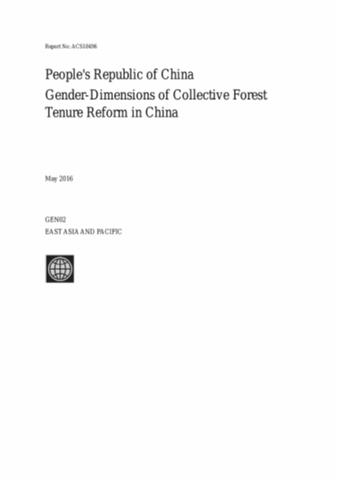The World Bank is a vital source of financial and technical assistance to developing countries around the world. We are not a bank in the ordinary sense but a unique partnership to reduce poverty and support development. The World Bank Group has two ambitious goals: End extreme poverty within a generation and boost shared prosperity.
- To end extreme poverty, the Bank's goal is to decrease the percentage of people living on less than $1.25 a day to no more than 3% by 2030.
- To promote shared prosperity, the goal is to promote income growth of the bottom 40% of the population in each country.
The World Bank Group comprises five institutions managed by their member countries.
The World Bank Group and Land: Working to protect the rights of existing land users and to help secure benefits for smallholder farmers
The World Bank (IBRD and IDA) interacts primarily with governments to increase agricultural productivity, strengthen land tenure policies and improve land governance. More than 90% of the World Bank’s agriculture portfolio focuses on the productivity and access to markets by small holder farmers. Ten percent of our projects focus on the governance of land tenure.
Similarly, investments by the International Finance Corporation (IFC), the World Bank Group’s private sector arm, including those in larger scale enterprises, overwhelmingly support smallholder farmers through improved access to finance, inputs and markets, and as direct suppliers. IFC invests in environmentally and socially sustainable private enterprises in all parts of the value chain (inputs such as irrigation and fertilizers, primary production, processing, transport and storage, traders, and risk management facilities including weather/crop insurance, warehouse financing, etc
For more information, visit the World Bank Group and land and food security (https://www.worldbank.org/en/topic/agriculture/brief/land-and-food-security1
Resources
Displaying 341 - 345 of 4907Assessing the Social Impact of Cotton Harvest Mechanization in Uzbekistan
The Government of Uzbekistan (GoU) has
recently adopted a policy to mechanize the cotton harvest as
part of its drive to modernize the agricultural sector.
Under Uzbekistan’s state-order system it is compulsory for
many farmers to grow cotton. They are contractually
obligated to produce stipulated quantities that are annually
set by the government, and must sell these to the GoU at a
price fixed by the government. Almost all cotton in
Disaster Risk Finance as a Tool for Development
Since 2013 The World Bank Group has
partnered with the Global Facility for Disaster Reduction
and Recovery and the U.K. Department for International
Development to address some of these gaps in evidence and
methodologies. The Disaster Risk Finance Impact Analytics
Project has made significant contributions to the
understanding of how to monitor and evaluate existing or
potential investments in disaster risk finance from a
Dynamics of Rural Growth in Bangladesh
The rural economy in Bangladesh has been
a powerful source of economic growth and has substantially
reduced poverty, especially since 2000, but the remarkable
transformation and unprecedented dynamism in rural
Bangladesh are an underexplored, underappreciated, and
largely untold story. The analysis identifies the key
changes occurring in the rural economy, the principal
drivers of rural incomes, the implications for policy, and
Transforming Vietnamese Agriculture
Over the past quarter century, Vietnam’s
agricultural sector has made enormous progress. Vietnam’s
performance in terms of agricultural yields, output, and
exports, however, has been more impressive than its gains in
efficiency, farmer welfare, and product quality. Vietnamese
agriculture now sits at a turning point. The agricultural
sector now faces growing domestic competition - from cities,
industry, and services - for labor, land, and water. Rising
Gender-Dimensions of Collective Forest Tenure Reform in China
The reform of China's collectively owned forest land, began in 2008, is arguably the largest land-reform undertaking in modern times in terms of area and people affected. Under the reform, forest lands have been contracted to rural households, allowing them more independence in exercising their rights and interests in the forest lands, giving them more opportunities to improve family incomes, and creating incentives for them to cultivate, conserve, and manage forests. These lands are home to some 610 million people, many of them poor.







